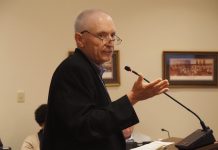
Mike Wolanin | The Republic Bob Garton, former Indiana state senator and president pro tem, poses for a photo in his home in Columbus, Ind., Friday, Aug. 11, 2023.
By Bud Herron
For The Republic
Somewhere in the archives of the Indiana University Library in Bloomington lies a “paper monument” to a man some Hoosier historians have called the most powerful person to serve in the Indiana Senate in the 20th century.
The “monument” to his time in office is a section of the library containing 23 cartons filled with the records of his service and political life.
If the the papers were stacked, the library staff points out the column would be 27 feet tall.
“Twenty-seven feet?” Robert D. Garton said to me with a smile and lifted eyebrows when I mentioned the archives recently during an interview at his home on the west side of Columbus. “That’s a bit overwhelming. I was in office a long time.”
That he was.
Garton was the senator representing Bartholomew County and parts of Johnson County for 36 years. For 26 of those years he was the Senate’s President Pro Tem, the top leadership position in that legislative body. No other senator in history has come close to that record for Senate leadership.
Elected to the Senate in 1970, Garton quickly rose in the ranks of Republican leadership. In his first term he was named to several important Senate committees and the Statehouse Press Corps listed him as “outstanding freshman legislator.” He also was touted as one of the top 100 “most promising legislators” in the entire country by the Eagleton Institute of Governmental Affairs at Rutgers University.
That first-term praise proved to be prophetic. By the time he left office nearly four decades later, his Senate leadership had — in the words of the introduction to IU’s online archives — “made integrity of process a central goal” with attention “to fairness and predictability.”
Garton also would be remembered for ordering creation of an ethics code and review procedures. This was no small achievement, considering the two Republicans who held the position of Senate President Pro Tem before him had each resigned from office after being indicted on criminal charges of bribery and influence peddling.
“What a mess you inherited,” I said to Garton. “Did your move for an ethics code help the party regain credibility?”
“Maybe,” he replied, “but that was not the issue. The issue was the ethical standards the people of Indiana deserve to have followed by the people they entrust to run their Senate.”
***
Robert D. Garton and his wife, Barbara, arrived in Columbus in 1959. He brought with him degrees from Iowa State and Cornell universities and four years’ experience as an officer in the Marine Corps. Garton had accepted a position in the personnel department at Cummins Engine Co., a position he would hold for two years before beginning his own management consulting company.
Barbara, a graphics designer and marketing specialist at Cosco, Inc. — now Dorel Juvenile Group Inc. — also began a career while she and Bob raised two children.
Then in 1962 Garton came to the attention of the Bartholomew County Republican Party when he became the youngest person ever to win the Toastmasters International Annual Speech Contest. But it wasn’t just his speaking ability that attracted the local party. The speech content was a testament to high values, ending with the phrase, “Character, the true measure of a man.”
In 1968 Garton had the chance to demonstrate that character for the first time in an election when his party picked him to run against incumbent Democratic Congressman Lee Hamilton for a seat in the U.S. House of Representatives.
Garton would lose that campaign, and Hamilton would go on to serve a total of 34 years in office. Yet the character demonstrated by both men in the campaign was noted by the press and the public, as issues rather than personal attacks were kept in focus. Both men remained friends throughout the campaign and long after the election ended.
Then, as the 1960s came to a close, Garton decided to run for the Indiana Senate, with Barbara by his side as supporter, adviser, administrative assistant and cheerleader. He won that race by a wide margin.
Only 37 years old and having never held public office, Garton found himself on a steep learning curve. But while he never had played the “politician games” of state government, he knew a bit about people; and he had a drive to “do the right thing” — an ethic he told me was taught to him from birth by his father, an osteopathic physician in rural Iowa.
“Much of what I had learned as a management consultant was needed in the Senate,” he said. “I quickly realized more standardized procedures and fairness were needed to get the ‘people’s work’ done.”
Still, his first term was not without political turmoil.
Always willing to follow his conscience when the majority “party line” clashed with beliefs close to his heart, Garton rose on the Senate floor in 1973 to deliver an impassioned extemporaneous speech in support of ratification of the Equal Rights Amendment for women. Only one of three Republican senators to vote for the ERA, he set off a firestorm in his party.
After several anonymous death threats were called in to the Statehouse switchboard — one from a woman who claimed she would be in the Senate gallery with a handgun to kill him if he voted for the amendment — Indiana State Police security was added in the Senate chamber. And, for a time, officers were assigned to his home in Columbus and also to escort his two children to and from school.
***
Although Garton most often fit perfectly into the small government, lower taxes and economic development pushes of his party, he continued to vote his conscience on other issues not backed by more hardline social conservatives.
He worked “across the aisle” with Democrats to back legislation supporting civil rights. When I asked what gave him the strength in his first term to support the ERA against most other GOP senators, he bristled and said “Women are equal to men. What other reason did I need?”
Garton also voted for and encouraged legislation for open records and open meetings of governmental bodies. For this effort he was awarded the “First Freedom Award” of the Hoosier State Press Association. His recognition was only one of two such awards ever presented to someone who was not a practicing journalist. The other award went to Father Theodore Hesburgh, iconic former president of Notre Dame University.
Garton worked to have groceries exempted from sales tax, supported legislation and funding for disabled citizens and and supported the addition of “sex” to the state’s list of classes of people protected from discrimination.
When I asked him why he didn’t pay more of a political price for such departures from the views of his far-right colleagues, he just shrugged his shoulders.
That question was answered later in a telephone conversation with former Indiana Democratic Sen. Lindel Hume of Princeton, whose served with Garton in the General Assembly during his tenure from 1974 t0 2014.
“Bob was more interested in the integrity of the legislative process than political dogma,” Hume said. “He was someone who those of us on both sides of the aisle could trust. I wish we had more of that in the General Assembly today. Bob’s character and conscience was respected on both sides, whether or not we always agreed with his positions.”
***
 Mike Wolanin | The Republic Bob Garton, former Indiana state senator and president pro tem, poses for a photo in his home in Columbus, Ind., Friday, Aug. 11, 2023.
Mike Wolanin | The Republic Bob Garton, former Indiana state senator and president pro tem, poses for a photo in his home in Columbus, Ind., Friday, Aug. 11, 2023.
Garton and Hume also joined forces for what Garton considers one of his most significant contributions to Indiana government.
In the late 1980s, computers were massive units with towering processors attached to cathode ray, TV-type, monitors. Three were in place in the Senate chambers for possible use of leadership but none were available for the rank and file senators to use to keep track of proposed legislation. And Garton points out that, even if every senator had one of the massive devices on their desk, it would have been of little use. The computers were in no way portable, while most of the daily work of a senator is in committee rooms and places other than the Senate chamber.
One day in the late 1980s, Garton was discussing the problem with a part-time employee of the Legislative Services Agency named Vasilis Koulolias. “Villis” — as he was known — was a Greek immigrant and self-avowed “computer geek” who was a student at Indiana University.
After listening awhile, “Villis” pulled out a small device he called a “laptop” and said “this will do everything you want to do and it is portable.”
Intrigued by the idea, Garton “crossed the political aisle” and presented it to it to Hume, who was known to be “computer savvy.” Hume said the company he worked for in Princeton had given such laptop computers to all managers and top level workers and he already was using that device in his work in the Senate.
The two men — Republican and Democratic leaders — joined forces to investigate further and then to become advocates in each party for what was to be the first use of linked portable computers by a governmental body in the United States. (“We are pretty sure in the entire world,” Hume told me in our telephone conversation.)
The whole process of convincing other legislators of the value and completing the installation took two years.
Hume, a mathematician and a man versed in technology said, “Bob’s vision led the state and the nation into a new age that would be inspired and copied by governments around the nation and the world.”
***
On a small strip of land near the entrance to downtown Columbus near the State Road 46 west bridge lies the Robert D. Garton Veterans Plaza dedicated in 2006 by the City of Columbus in honor of his military and government service. A plaque memorializing the accomplishments of Garton is attached to a stone monument in the center of the plaza.
The lengthy inscription on the monument lists 10 out of the scores of awards and honors Garton received from state and national agencies and organizations during his career. Listed at the top are three awards for “Excellence in State Legislative Leadership” and another as “Legislator of the Year” awarded by the Republican National Committee.
Next come awards for distinguished service in government, presented by diverse groups from the American Legion to the ARC of Indiana to the National Federation of Independent Businesses.
When I asked Garton what awards mean the most to him, he replied that the national William M. Bulger Excellence In State Leadership Award he received in 1999 was among the highest honors. That highly respected nonpartisan award is given annually to a single state legislator nationwide who best exemplifies “the highest principles of leadership — integrity, compassion, vision and courage.”
But, Garton added, “Some of the state and local awards are even more significant to me.” He said many of these were “thank you awards” for specific work he did in support of organizations and community projects less heralded in headlines but important and appreciated.
Garton has kept all of the plaques, trophies and statuettes presented to him through the years. When I asked him about them, he pulled a few of his most appreciated ones out of storage and placed them on his dining room table for me to see.
The “thank you” awards included recognition from groups such as the Indiana Retired Teacher’s Association, various organizations dedicated to persons with disabilities, the Indiana Council of Churches, Indiana Coalition of Human Services, and the American Council of Engineering Companies.
Garton noted that while he has greatly appreciated all the positive recognition through years, serving in government is not about formal honors but about taking care of the “public’s business” — sometimes behind the scenes — to make government work for the benefit of all.
***
 Mike Wolanin | The Republic Bob Garton, former Indiana state senator and president pro tem, poses for a photo in his home in Columbus, Ind., Friday, Aug. 11, 2023.
Mike Wolanin | The Republic Bob Garton, former Indiana state senator and president pro tem, poses for a photo in his home in Columbus, Ind., Friday, Aug. 11, 2023.
Now out of office since being defeated in the Republican primary election of 2006 by current Sen. Greg Walker, and just a few days short of his 90th birthday on Aug. 18, Garton reflected with his ever-present smile on those days.
At the same time, he refused to speculate or second-guess the reasons why his time in office was ended by a lopsided 58% to 42% margin in the Republican Primary of 2006. Gracious the night of his loss, he called Walker with congratulations and told reporters “It wasn’t our (campaign) organization. I am convinced that organizations win campaigns and candidates lose them. And this candidate lost.”
Brian Howey, veteran political analyst wrote that week in his “Howey Political Report” publication that Garton’s loss was brought about by Walker’s work at getting his voters to the polls, while Garton’s traditional base “did not show up.” In fact, only 4,897 GOP voters in the entire district showed up to vote — far less than in past elections.
Howey opined that Walker’s campaign, with the backing of his “right to life” network of voters, criticisms of public education and hardline statements about crime prevention played a role. So did high gasoline prices and war in the Middle East — topics on voters’ minds but for which state legislators had little involvement.
Today, some analysts point to the first decade of the 21st century as a time when the drift of the Republican Party nationally to far-right populism began to take hold — eventually leading to the election of Donald Trump to the presidency.
Former State Sen. Hume told me he believes Garton’s 2006 loss was a part of the birth of that Republican populism — pushing aside traditional Republic philosophies and replacing them “with an overbalanced emphasis on controversial social issues.”
“I think historians will see the elections of 2006 as the first election in Indiana where the ultra-right wing of the Republican party got a solid foothold,” Hume said. “I was in the opposing party, but we could see it happening, not just with Bob but with other traditional Republican candidates as well.”
Hume said, from that beginning, that the legislature has evolved — with the help of gerrymandered districts — into the dominance of a GOP supermajority which has little motivation to work with Democrats.
At the same time, with Garton’s defeat at the height of his political influence, Bartholomew and Johnson counties lost many of the benefit opportunities, legislatively and economically, that had come for so many years with being represented by the most powerful man in the Senate.
***
Today, Garton says he has very few regrets about the course he took over 36 years in office.
“Everyone makes mistakes and remembers things they might have done better,” Garton said during the interview. “I can recall times when I worked hard to get funding for some important program or project and then budget restraints forced me to pull it at the last minute.”
He even recalls a time when he all but promised funding for a project in Columbus, but, in the end, a need arose in the public schools that was greater and the money could not be allocated.
Garton still regrets that last-minute switch was necessary. Overall, however, he says regrets are few.
“I was fortunate enough to be selected for many years to serve the people of my district and the State of Indiana,” Garton said. “That is the honor I cherish.”
Asked what wisdom he would offer today to anyone running for public office office and wanting to do the job right, he said the formula for success and quality representation is simple: “Learn to listen and you will learn to lead.”
Like his “paper monument” deep in the archives of the Indiana University Library, that wisdom stands at least 27 feet tall in the history of the State of Indiana.
Bud Herron is the retired former publisher of The Republic and the former editor and publisher of the Daily Journal in Franklin. Contact him at [email protected].




